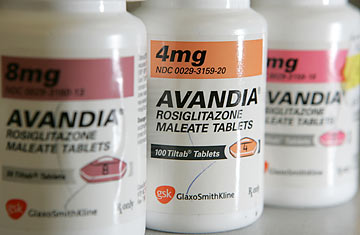
Bottles of Avandia diabetes medication are for sale at a pharmacy in San Anselmo, California.
After two days of contentious discussion, a federal advisory committee voted on Wednesday to keep the troubled diabetes drug Avandia (rosiglitazone) on the market, but with added restrictions for its use.
Experts had expected the 33-member panel to recommend removing the drug altogether, based on evidence that Avandia, prescribed to control blood sugar in patients with Type 2 diabetes, increases risk of heart attack. That is a particularly worrisome side effect in this population, considering that diabetes itself raises the risk of heart disease.
The panel's divided vote — with 12 members moving to ban the drug and 17 recommending that it continue to be sold with stricter warnings and limitations on use — could still be a devastating blow to the controversial 11-year-old medication. (Three members voted for no change, and one abstained.) The committee's recommendation will now go to the commissioner and deputy commissioner of the Food and Drug Administration (FDA), who will make a final decision on the drug's fate.
If sales of Avandia are further restricted, some experts say doctors will find prescribing the medication increasingly challenging. In order to dispense the drug, physicians will have to undergo specific training to ensure that they fully understand the risks associated with the drug and the limited conditions under which it can be prescribed, and patients may have to sign special consent forms indicating their awareness of and willingness to take on those risks. "It would be very, very restrictive," says Dr. Steven Nissen, a cardiologist at Cleveland Clinic who first raised concerns about Avandia's heart risks in 2007. "Essentially 95% of the use of this drug will go away if the [FDA] chooses that option."
Persistent questions about the safety of Avandia, which was approved in 1999, has made it the target of a Senate inquiry, as well as the subject of two FDA drug-safety meetings. The drug's maker, GlaxoSmithKline (GSK), was aware of the heightened heart risks as early as 2005, when their own combined analysis of trials showed a nearly 30% increased chance of heart attack in Avandia users compared with patients on placebo or other antidiabetes medications. That data was presented to the FDA, but given the limitations of the studies — they were not all designed or powered to assess heart risks specifically — the agency did not require the company at the time to add warnings on Avandia's label or to conduct additional testing on the drug.
It was not until 2007, when Nissen published his landmark meta-analysis of 42 trials involving Avandia — which found that the drug was associated with a 43% greater risk of heart attack, compared with other antidiabetes medications or placebo — that the FDA reviewed the safety of Avandia and decided to issue a black-box warning, its strongest alert, on the medication's packaging.
By that time, the Senate Finance Committee had already begun a broader investigation of pharmaceutical companies, spurred by allegations that drug-company officials had manipulated or suppressed data to avoid releasing negative findings on their products and that drug makers ghostwrote scientific articles under the names of academic researchers in order to enhance the marketability of their drugs. The inquiry uncovered internal GSK communications that suggested company officials had wanted to suppress information about the heart risks of Avandia from regulators and the public. "Per Sr Mgmt request, these data should not see the light of day to anyone outside of GSK," wrote one executive in 2001.
These e-mails also suggested that the company wanted to avoid a head-to-head comparison of their drug with another diabetes drug in its class, Actos (pioglitazone), because it knew Avandia would not compare favorably.
Regardless of what happens with Avandia, the panel's discussions only stoked the long-simmering debate within the scientific community over how drugs are brought to market and studied in the U.S. Some experts, including Nissen, have noted that there is considerable tension within the FDA, between the department that approves drugs and the one that is responsible for monitoring them for potential safety problems after they reach market. "Now, all the power rests within the Office of New Drugs [which approves drugs]," he says, and that means concerns raised during the post-approval monitoring process may not get heard. It is a particular concern with drugs that may cause long-term problems, such as increased risks of cancer or heart disease, since these effects often emerge only after a drug has been marketed and used in a large number patients — that is, in more patients and for a longer period of time than in clinical trials conducted by drug makers to gain approval.
Until the FDA makes its final decision, Avandia will remain on the market, but patients who are concerned about using it may consult their physicians about whether they should consider switching to another blood-sugar-controlling treatment. "They should understand that there are alternatives that they can take," says Dr. Martin Abrhamson, chief medical officer of the Joslin Diabetes Center.
